Subpoena Response Cost Reimbursement:
What are Other Companies Charging?
Safari provides a system for subpoena response, including collection of response cost reimbursement from serving parties. Every day, we talk with companies about how they handle subpoena cost reimbursement: their policies, practices, and how much they charge. We’ve assembled some FAQs and tips from the companies that have the greatest success in recovering reimbursement.
What are the rules?
Sometimes we hear from companies that hesitate to ask for reimbursement without conducting a 50-state survey of applicable rules. At last count, 15 state rules specifically require the requesting party to pay the reasonable cost of response.
The challenge, though, is that a fifty-state survey of civil rules doesn’t begin to account for every variable that might apply—for example, the type of proceeding, vertical-specific provision, type of requestor, or type of record.
Here's a place to start: for private-party subpoenas, commit to comply and ask that the requestor voluntarily reimburse your response cost. If your cost to comply were $100,000, you’d start by asking the requesting party to pay. Why not do the same when your cost is $100?
What if someone objects?
If someone objects, simply comply with the subpoena. The amount at stake isn’t worth the time it takes to argue, and you’re well ahead collecting from the vast majority who will pay.
What if someone files a motion to compel?
Outside of states where the applicable rule authorizes that the producing party can withhold documents until it receives reimbursement, the suggestion is not that you refuse to comply until you are paid. The idea is to collect reimbursement in a way that doesn’t invite a discovery dispute. If you comply and request voluntary reimbursement, there’s nothing to compel: you can always simply turn over the documents. Is it realistic to think you’ll invite a motion because you asked for reimbursement?

Paralegal,
ABC Supply
Subpoena Response Cost Reimbursement:
What are Other Companies Charging?
What’s the average charge?
The short answer is that the average per-response fee, across all serving parties, Safari customers, and matters, is just over $100. But the average isn’t particularly informative here because numerous criteria come into play, and in particular, low-end outliers skew the average downward. For example, some agencies impose a per-response cap, and a few states cap hourly rates. These numbers fall far short of reflecting a company’s actual response cost.
We usually find that when people ask about averages, what they really want to know is, what are others doing, and what is reasonable for us?
How do we arrive at a fee?
If you decide to take an “it’s reasonable to ask” approach, it follows that you might also take the approach of asking for a reasonable amount—that is, an amount corresponding to your estimated response cost. No one is suggesting that you turn subpoena response into a profit center; only that you make some effort to recoup the costs your company that these matters represent.
Determining response cost
You should see consistency in the steps required to collect and prepare different types of responses and the time that work takes. Your front-line team is your best source of this information.
For routine private-party subpoenas, our customers typically start with an assessment of how long it takes to gather and produce specific types of responsive information. Based on that, they categorize requests according to the cost they impose.
Factors when determining cost:
- Number of accounts (e.g. it takes 15 minutes to look up and export information for each account requested)
- Number of systems required to be searched (e.g. an employee record request requires searching payroll, timekeeping, and performance management systems)
- System capabilities (e.g. your customer records have to be exported one record at a time)
- Date range: if a request calls for data before a system upgrade or new implementation, it may implicate legacy systems that take longer to access.
- Storage fees: do any request types implicate material in offsite storage?
Subpoena Response Cost Reimbursement:
What are Other Companies Charging?
Create a flat-fee schedule that corresponds to your cost
The next step is to create one or more form invoices corresponding to the number of hours spent and cost in employee time. Rather than itemizing at the line-item level, use the formula above to arrive at a flat fee schedule.
An important benefit of this flat-fee approach is that you can recover a reasonable fee without anyone having to keep time or create matter-specific invoices. For routine requests, the amount at stake (usually a few hundred dollars) doesn’t justify that time. More importantly, there is a sameness to these requests and the time it takes to respond to them, and you can make that consistency work for you. If you know that a specific request type entails the same steps and takes a specific amount of time, why create a custom invoice for each?
What should an invoice look like?
A key to success in this approach is to avoid creating a specific, detailed invoice for every matter. Instead, as much as possible, categorize routine response types and create a fee schedule that reflects reasonable cost, using "custom" invoices only as needed.
For routine private-party subpoenas, our customers typically start with an assessment of how long it takes to gather and produce specific types of responsive information. Based on that, they categorize requests according to the cost they impose.

Associate General Counsel,
ABC Supply
What about specific caps?
When a state civil rule or other provision imposes a cap on hourly fees, we suggest a variation: figure out your typical hours for a routine request, multiply that by the hourly cap, and create a form invoice that reflects that number and generally describes the work involved in responding. In other words, honor the hourly cap without tracking time for every routine response.
Put Your Decisions into Action with
Safari’s SecureShare™ Portal
Once you establish your policies and amounts you will charge, the next step is to decide how you will put your process into action. Safari was specifically designed to meet that challenge with a built-in response delivery and cost recovery portal. Here's an overview:
CORPORATION
SAFARI
ISSUER
Subpoena Response Cost Reimbursement:
What are Other Companies Charging?
1. Delivery Setup
Safari includes a wizard to guide you through cost recovery and response delivery. It is the only solution that offers two-factor authentication with encrypted delivery and automatic invoice generation.
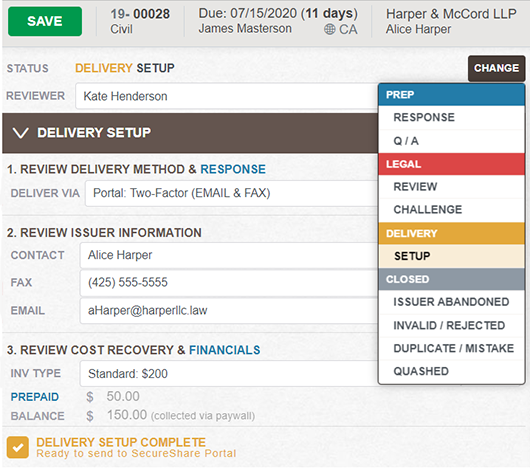
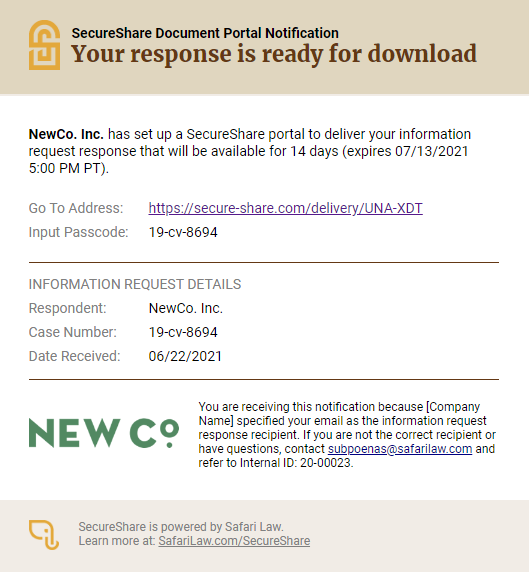
2. Email/Fax Notification
Once you configure the delivery options, Safari sends notification to the subpoena issuer with step-by-step instructions explaining how to retrieve the response files.
Subpoena Response Cost Reimbursement:
What are Other Companies Charging?
3. Portal Access
The link in the notification email sends the issuer to the portal login which always requires both a Response ID and a Passcode. Sending these keys separately ensures the files can only be accessed by the intended recipient and you are dealing with a valid issuer.
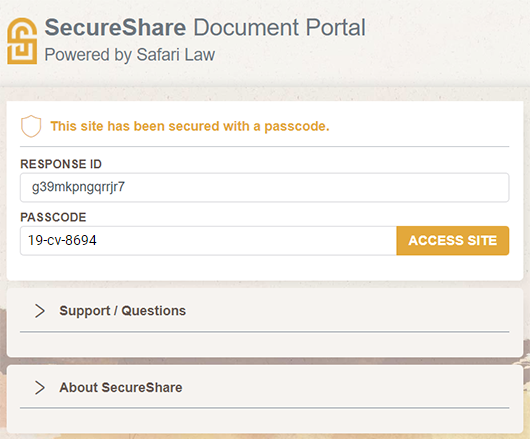
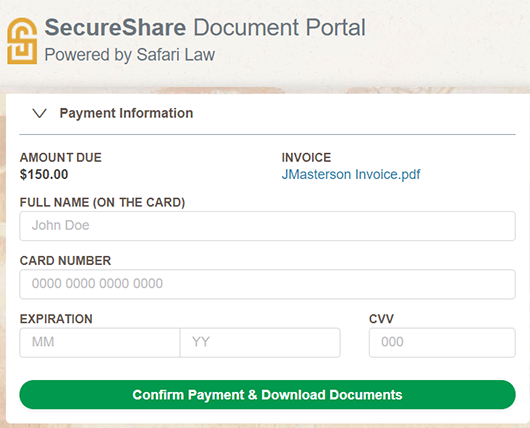
4. Paywall Cost Recovery
If you are requesting that the issuer reimburse your response costs, they will be prompted to pay with a credit card before they can continue. Safari presents an invoice as well as a list of the files that will be available for download once payment is complete.
Subpoena Response Cost Reimbursement:
What are Other Companies Charging?
5. File Download
Once authentication and payment is complete, the issuer can download the response files (as a combined .zip or individually). When the issuer confirms receipt, Safari immediately closes the portal and deletes the response files on the SecureShare server.
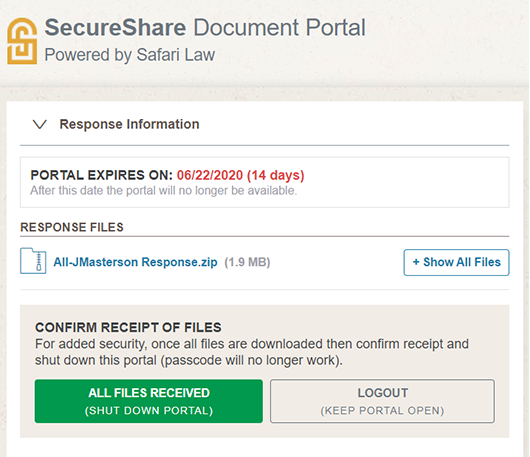
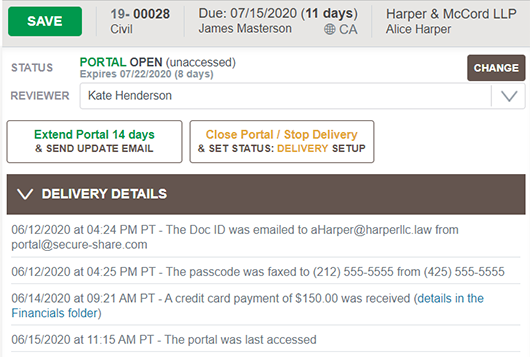
6. Delivery Monitoring
Companies can monitor portal access and activity from one integrated solution.
